Comforting Sounds: Mew CD singles 2002-2009
I recently started my review-through of the Danish art rock/prog pop band Mew's discography (see my site for the progress!), conveniently in time for the band calling it quits at the end of 2024. During the process of going through the albums, I've also been once again diving into one of my favourite musical topics: CD singles.
Mew's history in this respect is a little bit patchy, as it's perhaps to be expected from a band who only really got properly going in the early 2000s when the heyday of the CD single era was already starting to cross towards its eventual end. Mew's career had actually began all the way in the mid-90s and their first two albums were originally released exclusively in Denmark - a couple of singles were released during those eras, but they're primarily for the more obsessed hardcore collectors (and their more open wallets) to seek out. Mew then signed with Epic for a worldwide recording deal in the early 2000s and we got to enjoy a couple of promotional cycles worth of CD singles in the way the EUR/UK market at the time demanded: with plenty of non-album songs accompanying the A-sides. However, thanks to the time gaps between the records though it didn't take them too many albums until they had reached the fully digital era and with that, the physical promotional singles dried up.
This means that there's only a relatively short period of time when Mew released regular CD singles, effectively only extending across two album cycles (and a little bit extra). That said, whilst there isn't perhaps much to discuss in terms of quantity, what we do have is quite interesting. Mew proved out to be masters of the alternative takes: thanks to their whim to constantly tinker with and re-record their own material, most of their b-sides are new versions of familiar songs and often done in very interesting and exciting ways. In this post I'll be going through the handful of singles released during these years, discussing the contents and releases in detail - giving myself an excuse to talk about my collection, naturally
If you can't be bothered to go Discogs/eBay hunting for the singles, most of the b-sides for both Frengers and And the Glass Handed Kites can now also be found on the very quietly released deluxe reissues of said albums. Problem is, tracking those down is probably even more difficult: I've not located copies anywhere and quite frankly, it's just been easier to fill in the gaps with the singles. That said the reissues do contain some of the 7" single b-sides and other misc non-album material, so they are perhaps the completionist's choice if you just want to own the songs physically.
FRENGERS SINGLES (2002-2003)
Mew's international debut album Frengers was mostly made out of old, familiar songs: six out of the album's ten songs had previously appeared on the band's then-largely unknown Denmark-only albums and rather than let some of the best songs they had already written disappear into the archives, Mew re-recorded them for the new audience. They actually re-did more than what ended up on the album, presumably to make sure the record also had space for brand new songs and so that it would all hang together comfortably. Keep this in mind.
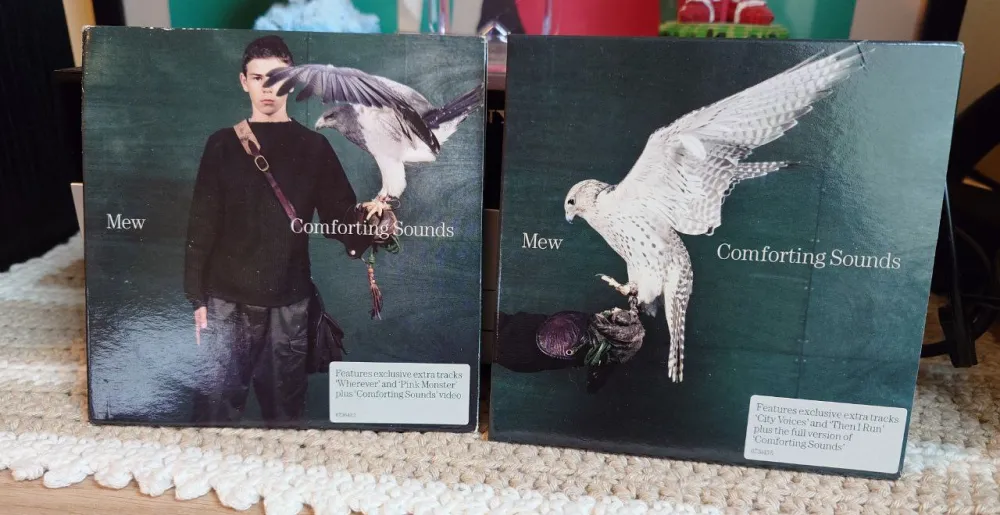
The Frengers campaign started in earnest with the March 2003 release of "Comforting Sounds". Now, "Comforting Sounds" has perhaps the largest claim to be considered Mew's signature song: it was the band's staple setlist closer, beloved by pretty much every single person and generally held as one of the very best songs in their repertoire. Originally released on the second album Half the World Is Watching Me (2000) and re-recorded for Frengers, it had already began to build its reputation and so I can get why it was picked as the band's grand debut in the eyes of the greater world. But that doesn't make it any more awful of a single decision. "Comforting Sounds" is a nine-minute colossus where the only real vocals appear during its first four minutes, as a gentle set of verses and barely-choruses which largely just set the stage for what's to come. From there the song slowly and steadily builds into the size of a small galaxy, looping the same central melody but growing larger and more majestic each time, throwing in new instrumental details and production flourish each go-around. The point is that it's big song, and the 3:48 radio edit is one of the worst butcherings of a song I've ever heard. It skips half the vocals and majority of the climax, basically just rushing through to the big fireworks finale and making an absolute mess of a song in the process. It's practically perverse.
But a single it was, in the UK and Europe at least. As was standard for UK CD singles at the time, two separate versions were issued at the same time with exclusive b-sides for each version in order to boost the chart performance - and for fans that meant more extra tracks. Both singles were issued in a cardboard case, with an inner sleeve protecting the disc (with a minimal Mew logo on one side being the only extra bit of decoration): this is also the standard Mew CD single package going forward (apart from a couple of exceptions) which makes things wonderfully consistent and uniform. All the CD1 singles are also "enhanced", i.e. in CD single terms you can view additional video content if you insert the disc into your PC's CD-ROM drive - it's always the music videos for the songs, in this case.
The must-have b-side of this lot is the brand new version of "Wherever", originally found on Mew's debut A Triumph for Man (1997). It was one of the highlights of its original album, where it sounded like a potentially huge song that was too shy and inward-looking to dare to seize the chance, though that juxtaposition is one of the reasons why it's one of the album's highlights. This new version that's featured here no longer has those inhibitions and much like the album itself, proudly and boldly dials itself up to maximum. "Wherever" is now a brooding anthem, drowned in hazy textural guitars before mightily exploding in its chorus to gargantuan proportions: the effect is like witnessing someone who's been hiding their true self all this time finally gathering the courage to shout out to the world who they are. Despite being so moody in stature the overall feeling here is triumphant; had this been on Frengers it would have been one of its cornerstones and it's mad it was left out, presumably simply to avoid the album being all old material reinvisioned. It's fantastic, and worth the price of admission alone.
The other b-sides for this double set includes the sweet and simple piano ballad "City Voices" which is disarmingly charming, and two tracks lifted directly from the debut album ("Then I Run" and "Pink Monster"). Again, it makes sense why they'd simply recycle songs from the earlier albums as b-sides because at the time very few had heard those albums or had access to them (unless you were a P2P/torrent kid), so these were technically "new" songs. For a collector though they're rather redundant, even if "Then I Run" continues to be excellent - "Pink Monster" is a goofy interlude and while it's questionable why it was picked, it does make for an amusing coda after the emotional heaviness of "Comforting Sounds" and "Wherever" on CD1.
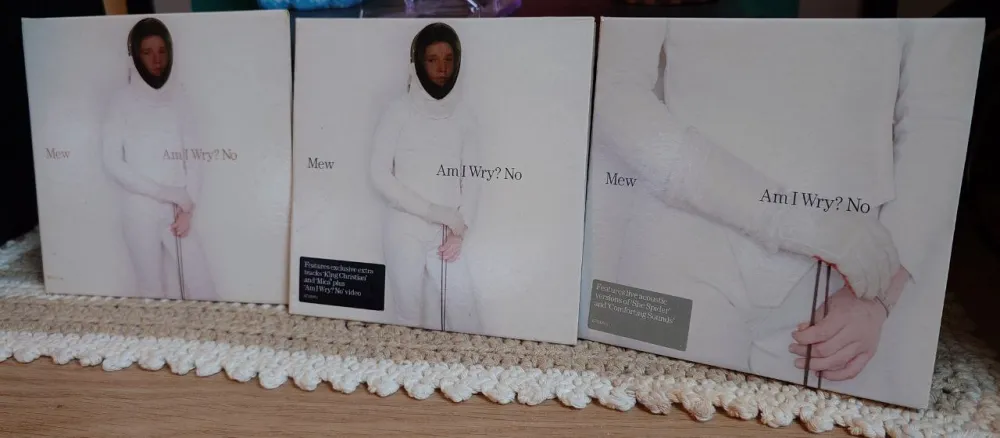
Frengers' opener "Am I Wry? No" was released as a single twice: once in 2002 as an early preview of what's to come, and then again in June 2003 when the promotional cycle was picking up the pace and reaching the release of the album. Both times the single got the standard CD1/CD2 treatment, but eagle-eyed readers may notice only three issues in the above photo. This is because if you just care about "unique" material, the 2002 UK CD2 is the only relevant choice out of the two discs because it features like "Like Paper Cuts": another dreamy piano ballad but this time with added ambient shenanigans and other atmospherics that make it particularly poignant and spellbinding, and it's perhaps my favourite Mew song of its kind. This used to play in the background of Mew's official website back in the day (when we thought it was really cool when websites had audio) and I remember being enchanted by this piece of music I had no idea of - it wasn't until much later that I finally discovered the song. The other b-sides across the two singles, including the only extra song on CD1, are more carry-forwards from A Triumph for Man. I love collecting CD singles, but I try to limit myself to issues with exclusive new material, rather than repeat-buy album tracks.
The 2003 issues are a lot more interesting however. For one, the CD1 version here features brand new Frengers session versions of "King Christian" and "Mica", formerly found on Half the World Is Watching Me, and they both succeed excellently through the new process and the flashier production and dynamics of Frengers. In fact, "King Christian" comes out better: while I love the goofy charm of the original version (the semi-embarrassed spoken word interlude included), the 2003 version digs deeper to find the killer pop song underneath the twee-adjacent fun and unleashes it into the world with tighter production and a firmer grip on the hooks. The chorus melody was always great, but here it's shatteringly brilliant, soaring like a shiny radio hit playing through the car radio while you're driving down the highway. I do prefer the original version of "Mica" - the naïve charisma of younger Mew works so well with the song's bright power pop lean and this more "professional" take loses a little bit of it - but we're still talking about an excellent track that many others would have included front and centre on their album. But, neither really suit the overall vision of what the band wanted to portray with Frengers and so here they lay, waiting to be discovered like buried treasure.
CD2 meanwhile features "live acoustic versions" of "She Spider" and Comforting Sounds", though in both cases the use of "acoustic" is dubious given all the keyboards, theremins and electric guitars appearing throughout. But they're really lovely versions and a lot more interesting than your standard live or acoustic versions, and in particular the version of "Comforting Sounds" is a little marvel: it's even longer than the album version but much less happens in it, the repeating grand finale for most parts simply staying in the same core melody without all the added bells and whistles (drums kick in at one point, then an electric guitar near the end). Yet it works wonderfully and only goes to highlight how great the heart of the song is even when it doesn't sound like the credits roll to the end of the world. These acoustic versions would end up foreshadowing Mew's attitude towards such things going forward, and we'll be hearing more of those later.
"Am I Wry? No" itself is of course a solid gold classic, but again goes to prove that Mew's music just does not translate to radio edits comfortably. The band love taking sudden swerves and adding multiple sections even into the songs that they intend to be big crowd pleasers, which then lengthen the runtime and all-around makes it less favourable for optimal radio play. But chopping all those build-ups and ironing out the plot twists take away much of what makes the songs so magical. The net positive is still good: the 3:35 edit of "Am I Wry? No" still contains the essence of what makes the five-minute original such a powerful anthem that it was deemed to be the ideal re-introduction for the band twice in their career.
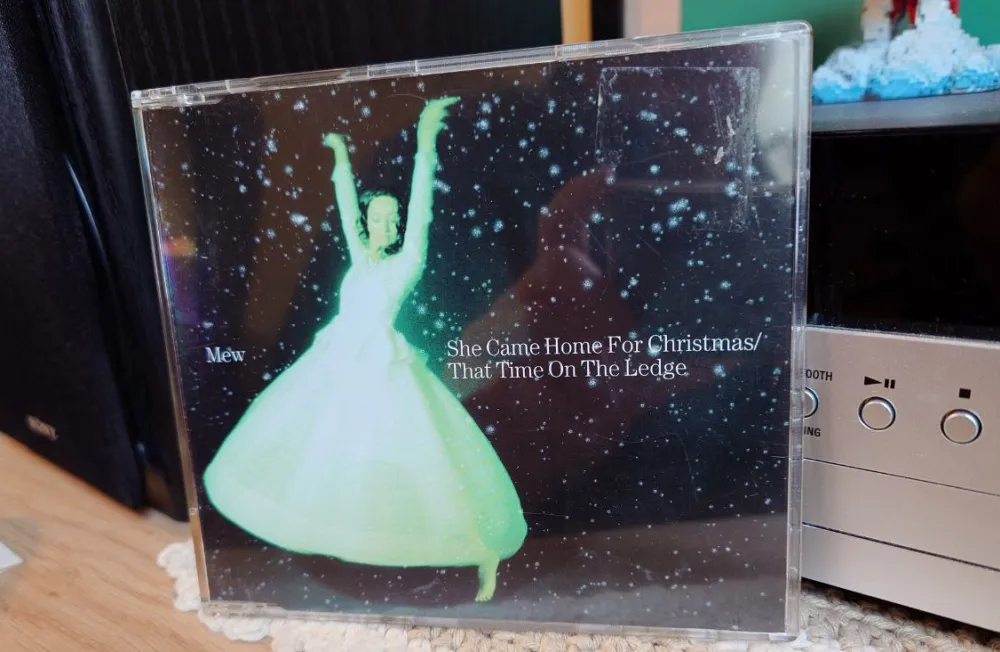
The Frengers campaign took an extended break for most of the second half of 2003 - "156" was released as a single after "Am I Wry? No" (and whilst "156" is my favourite Mew song, the b-sides were repeats of previous extras so I've not picked it up), but it took several months afterwards before the promo picked back up. All intentional, of course, as there was no way the power ballad "She Came Home for Christmas" wouldn't have been released as a single, and of course they waited until December 2003 to do so. "She Came Home for Christmas" was another re-recording for Frengers and not even its first time around the park: originally appearing on the band's debut album, it was already re-recorded once for the second album and appeared in the deluxe edition of the record. The "canonical" version found on Frengers is the boldest of them all, exploding into a blissfully romantic swoon of strings and crescendos, hiding the song's dark heart underneath saccharine-yet-earnest melodies. It's an evergreen - not just for Christmas!
The wistful and travel-weary "That Time on the Ledge" was the last studio recording released during this era and it feels like a coda for the long, exciting journey that made up Mew's 2003. It positively sighs as it rides its softly embracing rhythm, offering a hand to hold in form of an invitingly lush and lovely mood piece of a song. It sounds like the perfect end for the chapter, complements the A-side well and is an all-around excellent song to boot.
Unlike all the other Frengers singles, this comes in a slim jewel case. The liner notes have instructions on how to download official Mew ringtones, which is very wonderfully 2003.
AND THE GLASS HANDED KITES SINGLES (2005-2006)
When Mew returned with the twisted and tangled And the Glass Handed Kites, the world had already started to shift. Multiple CD single issues were no longer the norm in the increasingly digital world, but the music industry still hadn't decided quite what to replace it with. The mid-2000s were a wild west period of formats: singles typically were issued in more than one format but it was a crapshoot if you were getting a bunch of CD singles, an additional 7" or two to go with them, maybe even a DVD single still as well, and there was often a separate digital bundle as well. This post (and poster) only cares about the CD singles but even that's not consistent. The lead single "Apocalypso" only came on two 7" singles with no CD issue, "Special" had a CD single and a 7", "Why Are You Looking Grave?" randomly had an additional CD format and "The Zookeeper's Boy" got a CD and a 10". It's a mess! Welcome to the mid-2000s! At least the packaging remains consistent for most parts, including the gloss of the packaging which is in line with the main album's shiny covers.
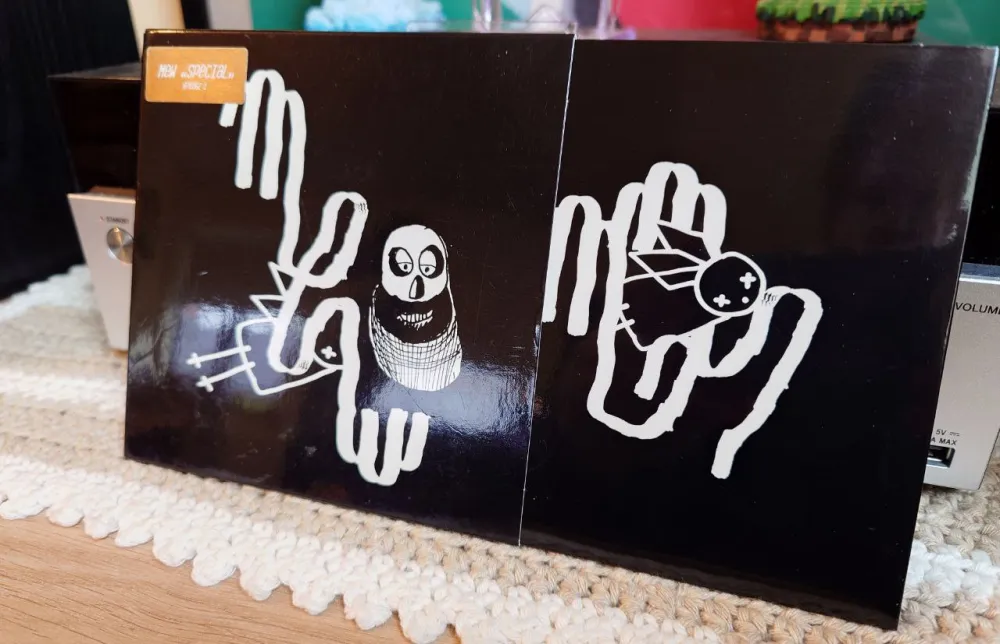
Following "Apocalypso", the second single off the album was the obvious one: the tight-if-erratic groove of "Special" is the most obvious radio play cut from the album, which otherwise didn't make removing songs out of its original context particularly easy. The whole of And the Glass Handed Kites is mixed together as one (mostly) connected set of songs segueing from one another, and that isn't even taking into account how those songs in themselves feature sudden turns and twitches of their own. All the singles contain the radio mixes of the songs which are this time more interesting than normally, as they give the songs a more "definite" start and end alongside any other tweaks. "Special" doesn't get changed much but it now no longer cuts abruptly if you were to play it on its own.
The sole studio track of the single is "Animals of Many Kinds", which is actually an alternative (or a demo?) version of "The Zookeeper's Boy". In practice it works much like an acoustic version, or at least Mew's interpretation of "acoustic": still twinkly and layered, just with less of the dramatic anthemics and rock guitars. It's different enough from the original to serve as something to listen to in its own right from time and time again, and continues Mew's tradition of neat alternate takes. The only other b-side here is a live version of "Apocalypso" (recorded in Finland!! Suomi mainittu!)... but don't trust the packaging, which only lists it as "Apocalypso (Live)" with a 4:45-ish length. In reality the song extends over seven minutes and includes an interpolation of "Special" as a bridge of sorts, effectively turning this into a medley. The trio of "Apocalypso"/"Special"/"The Zookeeper's Boy" is the album's heart and center and the greatest example of how it's all mixed together, and as the story goes these songs were effectively born from different sections of the same song which then took a life of their own. Could the way "Special" appears in the middle of "Apocalypso" here hint how the tracks were originally one? Speculation, speculation.
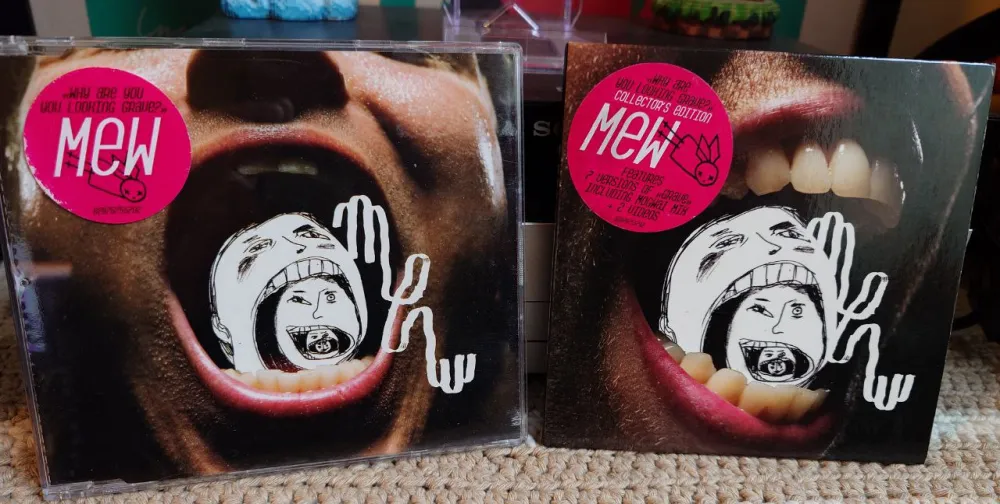
The standard CD single of the stadium anthem waltz "Why Are You Looking Grave" is practically quaint. There's the radio edit of the song which cuts off the long outro, shortens the breakdown and inexplicably removes J. Mascis' guest vocals from the second verse (Mew's frontman Jonas Bjerre sings it instead, though Mascis' backing vocals appear later on in the song), and then you have "Forever and Ever" which is another pretty piano ballad. There's some jingle bells in it this time too. It's pretty.
But just look at this limited, numbered edition (mine's 1350) and its seven-song tracklist, and that's before we get to all the enhanced content (the music video and live footage). The whole thing's almost full 30 minutes long and throws you in one version of "Why Are You Looking Grave" after another. You get the album version of course, with Mascis' vocals intact, and also an alternate vocal mix of the album version with Bjerre's second verse from the radio edit in case you want more of him but all of the song. There's two remixes: the Kissing Hoodies Mix is effectively a skeletal acoustic guitar version and it's very intimate and lovely, while Mogwai's remix takes the atmosphere of the outro and stretches it across ambient-esque six and a half minutes. The "Sun Demo" version has a slowly building intro before the song launches into its more familiar if slightly less energetic guise, and the "Kitchen Demo" is a slightly scruffier version of how we know the song and thus a little superfluous. The whole set is capped with a live version which is a good take all in all, but at the end of the disc I think I'm a little over Looking-Grave'd and the energy and dynamics of this version aren't distinct enough from all the others that came before to really warrant a hoorah.
But it's a really fun single, warts and all! It's not a million miles away from how I actually listen to these CD singles most of the time when doing write-ups like this: while I do give the physical discs a spin too, I have created digital rips with all the b-sides across the numerous issues bundled together. This limited edition issue basically does it for me and that's quite fun.
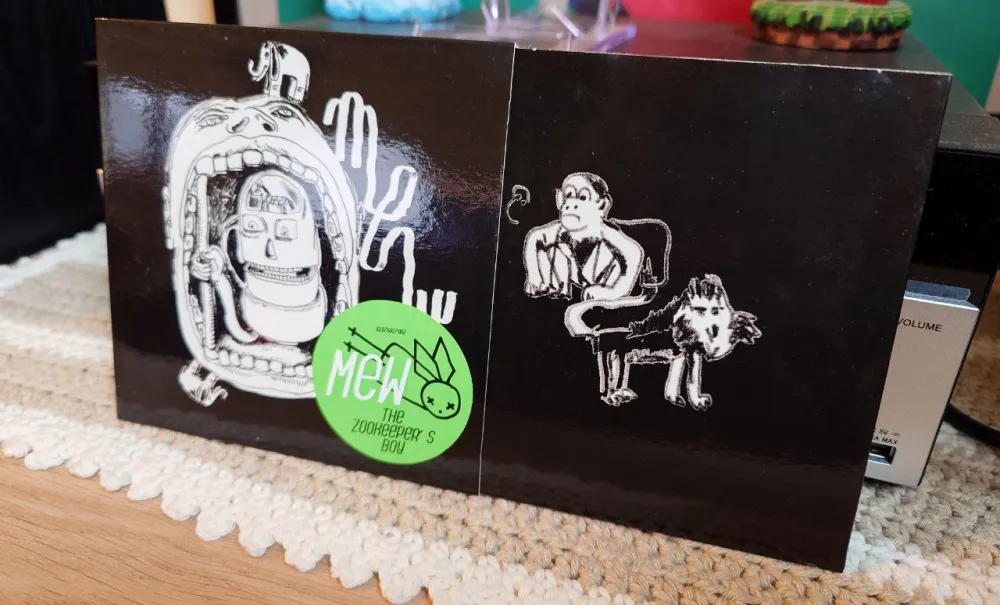
The final single for the And the Glass Handed Kites campaign was "The Zookeeper's Boy", once again closing the promo cycle with the big power ballad that was always destined to be a single. The radio edit primarily truncates the song's intro and outro, but like with "Special" now gives it a definite start and finish to go with it. My heart will always be owned by the album version - it was a firm favourite from day one - and the edit does sound slightly off to my ears, but the key elements are all there: the soaring chorus, the ever-overwhelming layers of backing vocals, the eccentric charm of it all somehow packed into a grand stadium singalong.
Cruelly the one studio b-side of this bunch was relegated to the 10" single, so we don't get to enjoy the sunshine piano pop of "Safe as Houses" in HQ. Instead, we have two "Red Versions" of Kites album cuts, which translates as Mew-style acoustic cuts. "A Dark Design" and "Chinaberry Tree", both explosive rock cuts, are now portrayed solely through the means of some acoustic guitars and chiming keyboards. Again, very lovely takes: the more I listen to Mew's acoustic b-sides the more I appreciate what they do with them. Most artists would simply quickly toss together a simple acoustic guitar version of the songs, but Mew's takes on the theme sound like they actually took a bit of time to figure out how to best display the songs in new light.
NO MORE STORIES EP (2009)
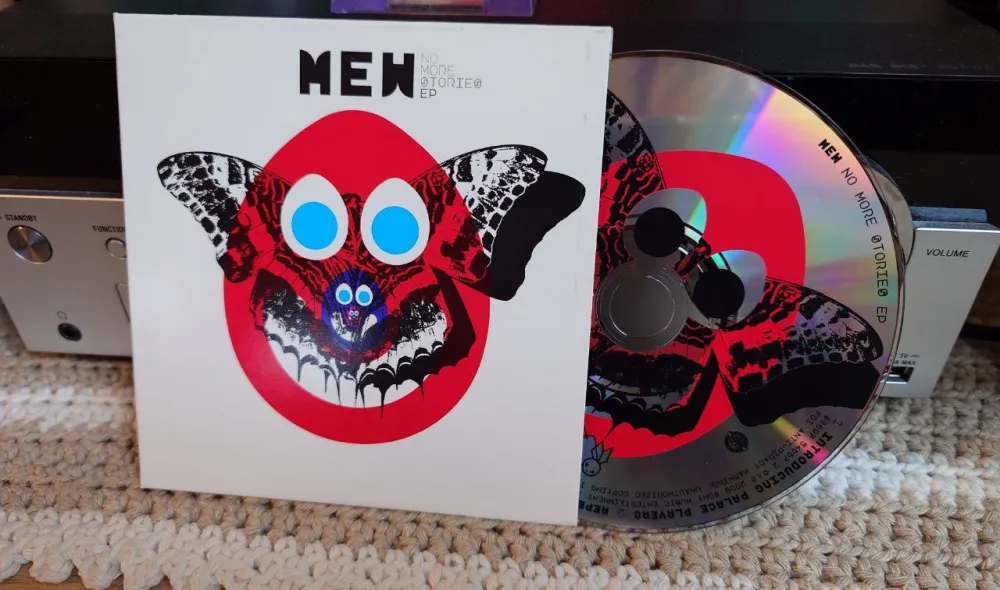
Mew's CD singles end after the And the Glass Handed Kites era: by the time Mew emerged again in 2009 everything had moved to digital singles and streaming. But they left us with one last olive branch as a farewell to tradition. The No More Stories... album (the full title is a whole 8-line poem and I'm not copying it here) was preceded by the more succinctly titled No More Stories EP which contained the two pre-album singles (the twitchy funk of "Introducing Palace Players" and the neurotic "Repeaterbeater") alongside three b-sides, labeled on the back cover as "washed away but found on the beach" to go with the album's full title about stories washing away for good.
It's a bit of an odd bunch of extra tracks, clearly comprised of pure leftovers. "Owl" is a minute-long instrumental which is largely just a single keyboard texture; "Start" is a piano ballad that spends its brisk two minutes gently clinking the keys and not really offering anything new to Mew's back catalogue of similar extra tracks (I haven't even talked about all the ones that have been on vinyl b-sides). The only "full" song here is the closing "Swimmer's Chant", which still feels like an idea of a song searching for its full shape. It's like the middle part of a trilogy: a build-up that's missing the initial setup as well as the final climax. All three songs are thoroughly pleasant but also obvious discards, fragments that got cut out during the recording process and hastily put together here to offer a semblance of additional studio material. The packaging similarly feels cheaper than before, as this time it's simply a basic thin cardboard sleeve like you'd find promos in. The singles culture was dying and this feels like a last breath, rather than an effort to keep things going.
None of the other singles from No More Stories... received physical single packages, and the singles for the last two albums that followed were purely streaming-only. Any additional studio material from the album sessions ended up as bonus tracks in the Japanese issues of the albums, and there wasn't much of it to begin with. It'd be disappointing if it wasn't so familiar for anyone who has spent time collecting CD singles from bands active during the 2000s: eventually things simply stop abruptly, annoying as it is. But for a few years Mew established themselves as a reliably interesting b-sides band - not one of the all-time greats or anything, but one whose bonus tracks shouldn't be completely forgotten about either. Given Mew's relatively small discography, there's a decent amount of additional material found beyond their albums and it's worth seeking out.